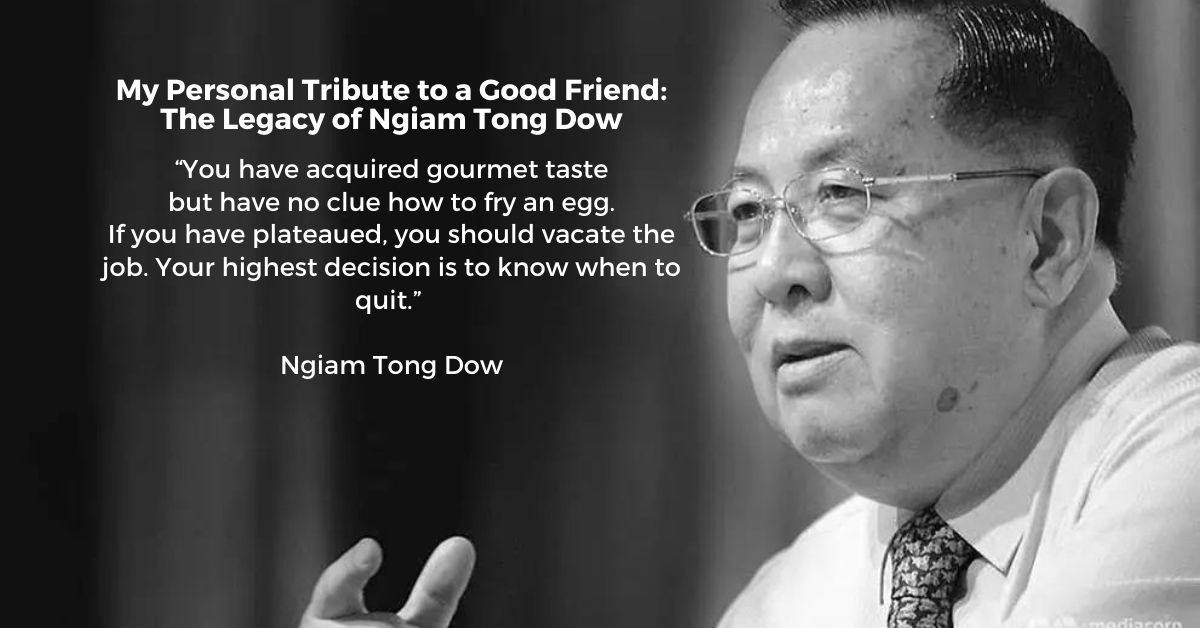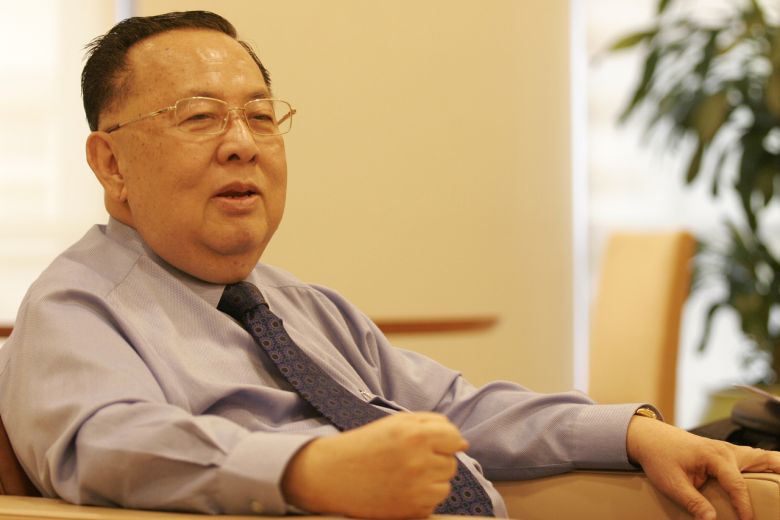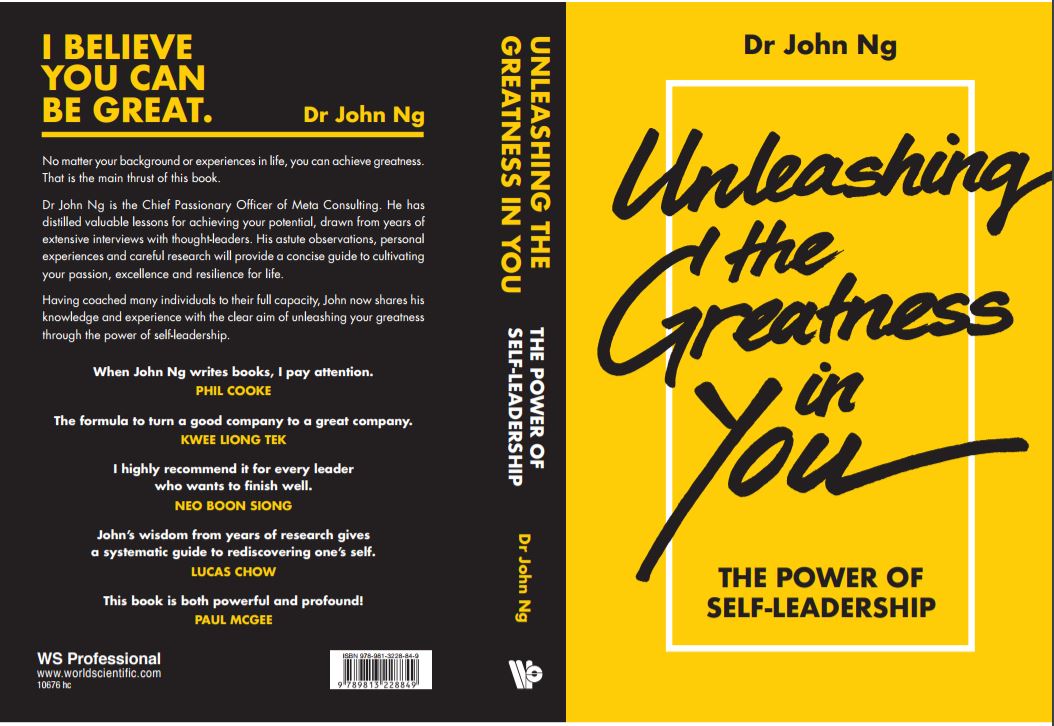My Personal Tribute to a Good Friend: The Legacy of Ngiam Tong Dow
“You have acquired gourmet taste
but have no clue how to fry an egg.
If you have plateaued, you should vacate the job. Your highest decision is to know when to quit.”
Ngiam Tong Dow
I mourn the loss of Ngiam Tong Dow, a former top civil servant and very good friend, this week.
He passed on at 83, having served as Permanent Secretary in the Finance, Trade and Industry, National Development, and Communication ministries, and in the Prime Minister’s Office. He had also served as Chairman of the Singapore Economic Development Board (EDB) and DBS Bank.
Four years ago I had the distinct honor of interviewing him for my book, Heart to Heart Exclusive Interviews with Asian Leaders…Crisis, Comebacks, and Character. Thereafter we became good friends, and used to have lunch once every two months, spending hours talking about life and leadership. And he was always very candid. We would listen intently to each other; often challenging each other’s perspectives and sharing our stories on life.
That he had endeared himself to many and his views are still highly respected, is testament to this truism: A great leader is one whom people would still seek out for advice as a friend and a mentor, even after they have left their stage, position and privileges.
So, what have I learned from him?
1. A Thinker and Doer
Tong Dow’s thought-leadership is well-documented. You would have read many of his thought-provoking articles in The Straits Times. His commentaries such as: ‘Government should help needy kids’, ‘Is Singapore becoming high cost, low tech?, ‘I now shout from the rooftop’, and ‘The politics behind development policies’ were soul-searching and deeply disturbing.
He made you re-examine your paradigms and question your well-rehearsed assumptions.
One of his comments that shook me up was about the casino issue. He said,
“To me, the casino decision was an easy road to success. We sacrifice our values just to create jobs and increase revenue. We need to earn our keep in the most honest and the hard way. When the Singapore Government invited Lee Ka Shing to bid for the casino, he said, “My policy is not to profit from human misery.” That’s the right rational decision.”ii
He was never afraid of putting forth his contrarian views, with rational logic and moral arguments.
He was also an avid reader and very well informed. His favorite subject was economics, always keeping up with the current trends and issues. But he had wider interests, like history. We would often exchange book titles and share our perspectives from them, and thoroughly enjoy the bantering.
I consider him a historian-futurist. He could delve into some Greek philosophy, and dissect its implications for leadership and governance. Yet he is a futurist, always thinking about the longer-term ramifications of decision-making.
When asked what kind of Singapore he hoped his grandchildren would inherit, he wrote about Sparta and Athens.
What wisdom!
Even after his retirement, his views were sought by the first Prime Minister, the late Mr. Lee Kuan Yew. “Mr. Lee invite me for lunch at least twice a year and we would spar for a few hours”, he recounted not with arrogance or pride but with a sense of honor and humility. Once he told me, “I always make myself available to the Singapore leadership and ready to serve.”
2. Tough and Tender
“When I leave command of my fleet,
I do not look over my shoulder neither do I spit on the deck.”
Lord Nelson
Those who work with him will remember him to be a tough man. He was tough on issues but tender at heart.
He considered himself a rational, no-nonsense leader, who was willing to make tough decisions even though they may not make him friends. “When I first read Plato’s Republic, I was totally dazzled by the great logic of
this organisational model where the best selects the best. But when I reached the end of the book, it dawned on me that though the starting point was meritocracy, the end result was dictatorship and elitism. In the end, that was how Sparta crumbled.”iii
Veteran diplomat Tommy Koh called him a “loving critic of Singapore”. “When he was the Permanent Secretary of the Ministry of Finance, I went to see him to beg for more funding for the Singapore Symphony Orchestra. He said no, until I reminded him that it was established by his mentor, Dr Goh Keng Swee, and that there was no leading city of the world without a resident orchestra.”
After a freak car accident that limited his walking, he hired a physiotherapist who came to his home regularly to help him. In one of our lunches, when the physio was there, Tong Dow even invited him to eat with us.
When I brought one of my younger staff, Suraj, who wanted him to be his mentor, he readily agreed. He was willing to spend time with young people. I had complained to him that the millennial generation was one of the toughest groups of people to manage.
He chided me, “John, they are the next generation of your leadership! They are our future. Learn to love them and engage with them!”
That changed my perspective completely.
He was a common people leader. I saw the way he respected his driver and cared for the ‘hoi polloi’. I asked him, “Why do you do that?” And he related this story to me:
“I believe in the native wisdom of the people. As Perm Sec, I was faced with a great crisis. My job was to close down the then Singapore Traction Company (STC). It was bankrupt. I didn’t know what to do.
There were 2000 or 3,000 conductors and drivers, who were losing their jobs. God was kind to us. There was a Mr. Lee, a trade unionist of STC who came up to me and said, “Can I help you? Let me give you a suggestion. We will tell them that the routes have been taken by Chinese companies, Tay Koh Yat and Green Bus.”
So, on that day, we drove to Kallang and locked the buses from STC and invited all the drivers and conductors to walk across to the other buses owned by Tay Koh Yat and Green Bus. In a twinkle of the eye, the whole crisis disappeared.
That experience taught me humility. With all the education I had, I learned to find wisdom from the common people. It was a very humbling experience; I had to listen to the people on the street than just the Harvard Business School graduates. That took away my arrogance and the arrogance of my people.
If you listen carefully to the common folks, there are pearls of wisdom. Unfortunately, those of us who are educated can become arrogant and prideful.”iv
3. Humble and God-fearing
Finally, I remember him as a humble and God-fearing man. He told me, “John, you must know when to quit. You must never out-stay your usefulness.” He went on to explain:
“My job in any ministry or organization is to raise the bar of the whole organization to a higher level. Therefore, the hardest decision is to decide when to quit. When I cannot lead my organization to a higher level, I should quit.
Many leaders overstay their usefulness. They think they are gods. They think they are the best just because they are the founders and have built their private business or the organization. But to be a great leader, you must learn to quit. You have to be honest with yourself and ask, “Can I bring the company to a new horizon? If not, get out of the way quickly!”v
That has been my guiding principle in my leadership.
It was Lord Nelson, the admiral who defeated the French at Waterloo, who said, “When I leave command of my fleet, I do not look over my shoulder neither do I spit on the deck.”
When I asked him about what legacy he wished to leave behind for the next generations. He replied spontaneously, “I would like my children and successors to judge my legacy. What I want my Singaporean friends to remember me for, is that I made good rational and God-fearing decisions. To be rational is not to take the easy road to success.”
Over the last 21⁄2 years when he was bedridden, I had wanted to visit him but was advised not to by his wife Jeanette. Initially, during the period when we could still converse over the phone, I would ask him about his condition. He would just say, “I am committing it to God.” He was ever conscious of his mortality. I would pray with him over the phone regularly. He was very grateful to me for my prayers and friendship.
I have lost a great mentor and sparring partner. But I know he has gone to a far better place, free from pain and suffering.
Adios, My Friend. May you rest in peace and enjoy the presence of the LORD.
John Ng
john@meta.com.sg
i John Ng & Alvin Foo, Heart to Heart, Exclusive Interviews with Asian Leaders. Crisis, Comebacks, & Character. World Scientific. 2016.
ii Ibid
iii Vikram Khanna, ‘Ngiam Tong Dow has always had Singapore’s best interests at heart’, Straits Times. Nov 21, 2003.
iv Ibid. v ibid





